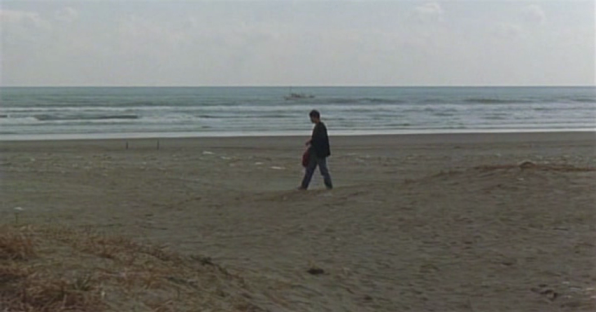Valerie (Birgit Moller, 2006) - German cinematographer Moller found inspiration for her sole feature film to date from an American magazine article on "shadow women", a subculture of poverty stricken models who despite their homelessness are able to carry on - mainly through various means of deception, self and otherwise - some semblance of extravagant social lifestyle. Valerie chronicles a handful of late-December days and nights in the life of its titular character (played with tremendous pluck by the stunning Agata Buzek - think Sarah Polley after a month in a midievil stretch device), one such lost soul whose crumbling career has left her floating through the chilly Christmas streets of Berlin destitute and sleeping in a car, hiding the reality of her desperate situation from friends and scrambling to maintain an image of opulence by opportunistically seizing any shard of luxury and its accompanying sense of power that comes her way. The gritty, intimate, hand held visual approach immediately calls to mind the Dardennes (with splashes of dutch tilt thrown in for good measure), but Moller is more interested in the mysteries of complex human behavior and its response/relation to the inescapable passage of time than she is in acts of great moral weight, and the intensity with which the camera aligns itself to the character's experience, the degree to which it inhabits her sad, nervous energy, rendering any notion of potential judgement moot, puts the film closer to the realm of something like Barbara Loden's remarkable Wanda. Never straining for tidy psychology, and avoiding easy depictions of either abject misery or fortuitous, epiphanic Moments, Valerie unspools as a sustained note of deep, stifled melancholy. Highly recommended.
____________________________________
The Eclipse (Conor McPherson, 2009) - A widower quietly tortured by memories of his dead wife, and yet he dreams about ghosts of the living. A failed writer of the supernatural who falls in love with a successful author on the same subject, while a macabre personal prophecy seems to inscribe itself into the very air of the chilly seaside that surrounds all. The genre blend foundation of this supremely odd Irish production - equal parts modern horror, classical romance and gothic poetic - works much better on the level of tone than plot; narratively it flirts dangerously close with a certain trendy kind of overdetermined strategy involving the piecemeal doling out of vague intrigues surrounding some kind of diffuse revelation that might as well be a black hole. It very often feels like a filmed first draft, and the constant gear switching offers little help in the way of clarity of vision, but at the same time it's in the rough-hewn elasticity of this conglomeration of emotional registers that the movie eventually attains its own audacious, peculiar integrity. For a parable in which the space between the living and the dead, the haunter and the haunted, the experienced and the imagined, and the fantastic and the staid is all but elusive, it certainly stands to reason that a harsh transition from pensive reverie to BOO! jump could hold more value and resonance than a solid chunk of straightforward exposition. At under 90 minutes there is still some fat to be found (mainly in the form of Aidan Quinn's arrogant, annoying twit, completely disconnected from everything relevant and yet somehow in command of his own subplot) and a few too many fancy-to-be-fancy camera moves (not something that typically irks me, but a little too flagrant and unnecessary here); what I will remember most are the handful of quiet, unassuming moments where one or two of the characters are rendered by the lighting as flat, whispering graphics against the hazy backdrop of the living world, moments where the movie briefly seems to stumble onto a distillation of everything that it's interested in and finds beautiful.


























